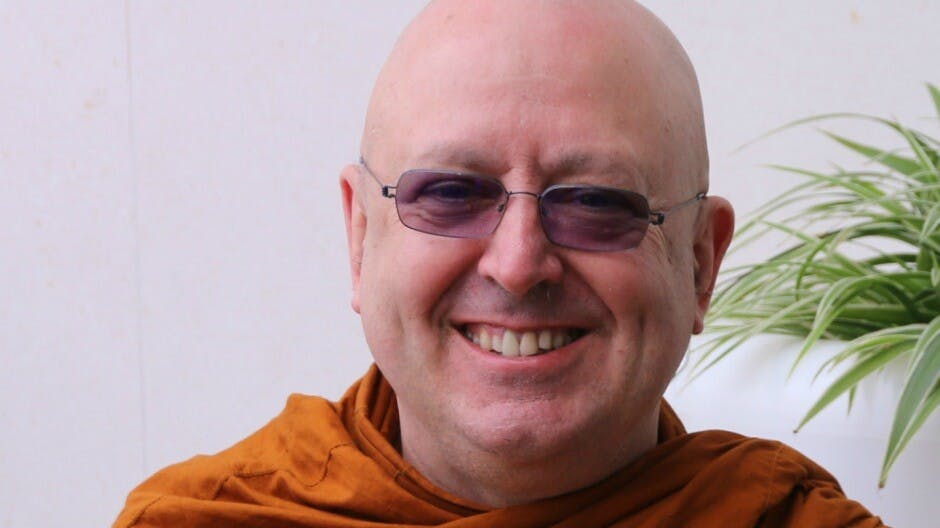Previously on the Conversation with Ajahn Brahm:
How to Mend a Broken Heart(訪談錄上集)
Hope in Hurt(中集)
Ajahn Brahm is a British Theravada Buddhist monk born in London. He read theoretical physics at The University of Cambridge and graduated with first class honours. A year later, he traveled to Thailand to become a monk and to train with the Ajahn Chah Bodhinyana Mahathera. He is now the Abbot of Bodhinyana Monastery in Western Australia, and the Spiritual Director of the Buddhist Society of Western Australia, amongst others. He has been invited many a time to give seminars at the headquarters of Facebook, Google and the United Nations. The books he authored have been translated into many languages, including famously The Art of Disappearing, and Good? Bad? Who Knows?
Ajahn Brahm,生於倫敦,劍橋大學理論物理學一級榮譽畢業。出家為僧40多年,師隨南傳佛教(上座部)尊者阿姜查(Ajahn Chah)。時常獲邀到重要國際會議和跨國組織總部演講,如聯合國、Google、Facebook。著作風行全球,有多種語言譯本,如《禪悅在當下》、《好?壞?誰知道?》(本社特闢專欄轉載中譯本)。目前承擔多種佛教職務,為澳洲柏斯覺乘寺住持。Ajahn,泰語「老師」。
By Man-ying A. Ho 文:何敏盈
放下與成功 Letting Go and Success
訪者:我想心思需要好好鍛練。有時我不停叫自己放開、好好睡覺、放開、好好睡覺,可仍然睡不着。
Ajahn:那是因為你逼自己放手。很多人最大的苦處,就在於此,覺得非要掌控一切不可。他們以為要平靜下來,就須得做些什麼。這根本就錯了,什麼都不做才好。是「放下逼自己」,不是「逼自己放下」。
訪者:也就是說,心靈的本然狀態,是一切都放開的麼?
Ajahn:對,只是我們忘了。我們還那麼小的時候,就得上學,就得做這個、做那個,而且都試過被老師問怎麼看某件事情時無話可說,並因此嘗到苦果。你不發表一下意見的話,大家都會覺得你是傻子。這些從小到大的經歷,讓我們學懂要努力向上、自強不息,而且還做得頭頭是道。可是放鬆、放下是另一回事,不懂的人比懂的人多。這門技藝可真是失傳了。
訪者:如何發現生命的真正意義?你大概會說「什麼也不做」吧?
Ajahn:Exactly!這就平衡到生活了。可能你正在談戀愛(或者想談戀愛),還要發展事業,還要賺錢去享受生活、照顧父母……那麼多事情,怎麼做呢?——你總是可以憑仁心處事,還有就是找個時間透透氣,平衡一下。成功的秘密,正是平衡。要平衡為事業、自己、所愛之人的種種付出。這時代——容我說句冒犯的話——特別是女孩子,太會犧牲自己成全別人了,全世界只有一個人你沒有照顧到,那就是你自己。所以我教導的目標之一,就是讓人知道他們自己也是重要的,值得收穫自己所曾付出的。
訪者:工作範疇中,有沒有什麼你會說是最享受的?
Ajahn:沒有,我最享受的總是此時此刻。不必去比較,盡情地活著就好了。不必老是想著完成手頭這件事之後,就要做些你更享受、更重要、更快樂的事,這樣會很痛苦。你此刻正在哪裏、在做什麼,這才最重要。享受它罷。如果你總是嘗試擺脫這些時刻,你將終身都不會成功。
訪者:何謂成功?
Ajahn:喜樂就是成功,而且不是因為成功所以喜樂,是因為喜樂所以成功。
訪者:這樣出名和受歡迎,感覺如何?
Ajahn:怪,很怪,我出家時並沒有這個打算。不過,這也會令你有條件做一些事情,令世界好一點。(訪者:力量隨地位而來。)是的,所以要用這種力量去做好事,幫助這個世界。我覺得透過書本、YouTube 接觸人很有意思。上次希拉莉在超級星期二之後,在電視上說了一句:愛與仁慈。這可不是美國的日常用語,本是南傳佛教用的,可見有些意念的確傳開了。有人告訴我,昂山素姬在領取諾貝爾和平獎時——那時軍人還在緬甸執政呢,她說——我們應該敞開心胸迎接他們。我也知道有人給她帶去了一本我的書,是我一個追隨者親手交給她的。這多麼好啊。(訪者:她讀過了?)她肯定讀過。我想那些意念一直留在她的腦海裏,領獎時就說出來了。有時我會猜想這感召力到底已經去得多遠。比如說 Kindfulness——不是 Mindfulness——如何一點點地改變世界。有時我會覺得,自己只是小小一個出家人,可以做的不多,但有時又會發現,小小一個好意念能夠去得很遠、很遠,即使大家未必知道來自哪裏。這些網絡上流行的 memes,可能會造就一些好事情,這給我很真實的快樂。

Interviewer:You know the mind requires training. Sometimes I keep telling myself, “That’s ok, you should let go and sleep. Let go and sleep.” Then I fail to sleep.
Ajahn:It’s because you try to let things go. This is the biggest problem with people. They’re control freaks. They always think if we’re gonna make peace, we have to make things happen. That is the reason why we don’t have much peace in the first place. We’re always trying to make it happen, to do things. Instead, we don’t do anything. We let go of trying, we don’t try to let go.
Interviewer:So do you mean that letting go is like a default stage of mind?
Interviewer:It is, which we’ve forgotten. Because ever since you were small, you went to school, you always have to do things. Sometimes the teacher would ask you, “What do you think of this?” And you would say nothing and you would get into trouble for that. You’re considered to be a dummy if you don’t have any opinion about something. So you’ve learned, in school, in your training, in life to get to where you are by all your hard efforts, which is well done. But to be able to do the other part of life to relax and let go, more often people don’t know how to do it. They’ve lost the skills of just doing nothing.
Interviewer:What do we do to explore the real meaning of life? Now maybe you would say, “Let’s do nothing.”
Interviewer:Exactly! This is how to balance your life. And then you’re living in this world, you know you’re a girl, you probably got a relationship, or you’re wanting a relationship, and you’re trying to get by your life, your career, enough money to enjoy yourself, looking after your parents. There’s so much which we’re doing in this life. But how are you doing it? You find that you can always do things with kindness, you can always every now and again take a bit of a break to balance your life. And that’s actually the secret of a successful life: finding that balance. That balance between giving to your career, giving to yourself, giving to your loved ones. What happens these days is most people, please excuse me, especially women, you sacrifice yourself for others too much, and it’s one person in this whole world you never really help: yourself. So one of the goals of my teaching is to let people know they count, they’re important. And they must also get to share of everything you give in life, give something back cause you count as well.
Interviewer:Is there anything you would say that you enjoy the most now in your work?
Ajahn:No, I enjoy this moment most. So you don’t compare. You try to live as much as possible in life. So that way you don’t go seeking for pleasure in somewhere else because you know when I finish this I can do something more enjoyable, more important. That’ll create lots of pain and suffering for you. So wherever you are, whatever you’re doing, it’s the most important thing in your life. Enjoy it. If you try to get rid of these moments, you’ll never be successful in your life.
Interviewer:What do you think is success?
Ajahn:Happiness is success. It’s not the success that leads to happiness. It’s the happiness causes success.
Interviewer:How does it feel to be so famous and so popular?
Ajahn:Weird. So weird. Because that’s not what you become a monk for. But then again you feel that it gives you a position to do something, to help the world. (Interviewer: Position is powerful.) Yeah so make you have the power and to do something good for the world. And what I’m really interested in is the reach which you have, especially through books, through YouTube. I did see on the TV, after the last super Tuesday, that Hilary Clinton, she was using a word, you know which is not usually used in the United States: love and kindness. Something is getting in there because that’s a very Theravada Buddhist word. Somebody alerted me to Aung San Suu Kyi’s Nobel Prize acceptance speech. And she said, when the military was still in power in Burma, she said we should open the door of our hearts to the military. And I know that she’s received my book, it’s one of my fans handed in to her personally. Just that great. (Interviewer: She read that?) She did read it. I know it for sure. That phrase just got into her brain and she used it in her Nobel Prize acceptance speech. Sometimes I wonder about how far the influence goes. Yeah so even the phrase like that and the related phrase “kindfulness” you know, instead of mindfulness, so see how that gets into the world and starts changing it. Sometimes you feel that you know you’re just a little monk and you don’t do very much, but sometimes, a little idea that you never get acknowledged because people never know where it started from, but it goes round and round and round; and if it’s a good idea, it grows. Maybe some of those memes, and it actually has done something, and it gives me the raw happiness.
厚德載物 Kind-fulness
訪者:可以多談一點 kindfulness 嗎?
Ajahn:你知道 mindfulness 是個很流行的現象(訪者:對,而且是個產業?)產業,而且正因為它那麼受歡迎,所以會有些副作用。有一次我到訪 Shambhala(一間佛教出版社),有個常常捐獻和造訪他們的人,告訴他們自覺有點內疚:他發起了 mindfulness,而且把它當成志業,全心全意的推廣,但自己明明是佛教徒,這概念卻和其他佛理無甚關係,他很想把更多的佛理融會進去。我覺得這想法實在好極,就跟他們說,可以加進去的是 kindness、同情、溫柔——所以有就了 kindfulness,而且只消改動 mindfulness 一個字母,很合用。
訪者:你認為生命中最重要的是什麼——一個字說完——很難吧,哈哈!
Ajahn:現在。(訪者:噢,一點都不難!)當然不。
訪者:片語?
Ajahn:Kindfulness。意料之內,對吧?
訪者:句子?
Ajahn:和好、仁善、溫柔。我常常這麼說,因為總是沒人在意。大家都會說 mindful,但怎樣才能做到呢?就是復和:不再跟生活、朋友爭辯,也不再與此時此刻、與自己的身體爭辯。正如你不可以與天氣吵架,你只可以接受它,與它和好。你仁善待人,別人就會願意和你合作。生氣只會製造更多問題;仁善待人,則往往會發現處理問題有很大進展。
訪者:有些人可能會說,我受過那麼多苦——比如說,被親生父親強暴,又從來不曾吃飽過——生命這樣待我,我為什麼還要對人好?
Ajahn:因為——當你仁慈地面對自己的過去,過去就不會再折磨你。你對過去懷有敵意,它於是也盡其所能的摧毀你。就像一隻在狂怒中哮叫的動物,你要以仁心相待,牠才會平靜下來,不想咬你。對待將來也是一樣:人對待將來有時也怒氣沖天。太過擔憂了。以仁心相待吧。

Interviewer:Could you tell me more about kindfulness?
Ajahn:Yes. You know that mindfulness is a huge phenomena (Interviewer: Yes, and industry?) Industry, and it has all these bad side effects because it’s becoming so popular, but you know it’s not enough. There was a Buddhist publishing house called Shambhala, and I visited there a couple of years ago. One of their regular contributors and visitors was telling them that he felt a bit guilty, as a buddhist, to be talking about mindfulness, and separate it from the rest of buddhist teaching. And saying that in this part of his career, his life, having established mindfulness, he’s the one who started it, that now he wants to add the other parts of buddhist teachings. And I was so impressed with that. And I was telling them the one part of that which can be was the kindness, compassion, the softness. When you have kindfulness and mindfulness, it becomes kindfulness. So kindfulness, and that’s like mindfulness; it just changes the first letter so it fits.
Interviewer:What do you think is the most important thing in your life – in one word? It’s difficult, isn’t it? Haha!
Ajahn:Now. (Interviewer:Oh, it’s not difficult for you at all.) Of course not.
Interviewer:How about one phrase?
Ajahn:Kindfulness. So predictable, isn’t it?
Interviewer:One sentence?
Ajahn:Make peace, be kind, be gentle. I keep saying that because it’s neglected. People always say be mindful but actually where that mindfulness comes from? It’s making peace, don’t make war with life, or with your friends; make peace, with life and with people, and with your body, with this moment. You can’t fight the weather, you can make peace with it, you can be kind to others, and then others want to work with you. And we have a lot of progress to solve problems when we’re kind. When we’re angry, we make more problems.
Interviewer:Some people may say that I suffer so much in life. Maybe I was raped by my father and I’ve never had enough food to eat. Why do I have to be kind to others? Life isn’t kind to me.
Ajahn:It’s because when you’re kind to your past, then your past doesn’t torture you anymore. People are unkind to their past, then it try and try to destroy these people. When you’re kind it’s like an animal who’s snarling at you – it calms down, it doesn’t bite you. If you’re kind to your past, your past doesn’t bite you anymore. And it’s the same with your future, be kind to your future. So sometimes people are so angry at their future. They worry too much. Be kind to it.
享受大冒險 Relish the Remarkable Ride
訪者:如何以仁心面對將來?
Ajahn:專注看將來可能會遇見的美好事情吧,你就可以微笑以對。想想看,這趟歷險會很精彩,不知道會帶你去哪裏。你今年多大年紀了?——你不知道來年你會在哪裏,更不要說五年、十年了。生活是場大歷險,誰知道會去哪裏呢?多麼刺激。(我想我希望未來穩定些、有計劃些。)不是吧!那豈不像死人一樣?死人的日子才能夠波瀾不興,因為棺材裏什麼都不會發生。其實你想要的不是穩定,是安全感。你希望不必害怕什麼事情會失控——想要這種信心。你希望有信心處理所有事情,無論發生什麼、人在哪裏。(訪者:如何才會有這種信心?)就是和善、仁慈、溫柔呀。受了傷你也能夠處理;一旦失望了——但活着就是這樣,我們都注定要受際遇摧殘。所以,真的,千萬不要太戀棧安全感,安全會破壞生活本身。(訪者:安全也是指不必面對失望與憤怒。)對,但你並不真正安全。想想看,你不去探索,不去把握機會,不去衝破自己的界限,難道到了生命的盡頭才回望說:「啊,我本來有這些機會的,真希望我當時有把握到。」這樣好嗎?——要把握機會,那些很明顯把握了是比較聰明的機會。不要做個衝動的傻瓜,但也不要那麼安全。
訪者:你呢?有沒有試過把握一些重要的機會,然後回頭一看,深自慶幸?
Ajahn:有啊,比如說堅持給比丘尼剃度。當時我並非別無選擇的,我有最終決定權:「做,還是不做?」僧人都看著我做這個困難的抉擇、這個足以改變一生的抉擇。但我打從心底感受得到,知道必須要怎樣做——這件事做對了。我們總會遇見這樣一些重要時刻:要麼你就把握住它,要麼你就後悔終身。總之,做對的事,跟隨你心底感受到的方向。你不會後悔的,不必走那條安全的路。做對的事、做必須要做的事。

Interviewer:How to be kind to your future?
Ajahn:Oh just see all the positive things which might happen in the future. And you can smile at your future. It’s a wonderful adventure you’re gonna go on. You don’t know where it’s gonna go. How old are you now? You don’t know where you’re gonna be in the next year, let alone 5 years and 10 years. It’s a huge adventure called the life, who knows where it’s gonna go? It’s incredibly exciting. (Interviewer: I think I’d like things to be more stable and planned.) Ah come on, like you’re dead. The only thing to be stable is for dead people. When they’re in their coffin, then things don’t happen. But you know what you don’t want – you don’t want stability, you want security, the lack of fear that you’re gonna handle it, and that is confidence. Cause confidence is you can handle anything, whatever happens in your life, wherever you go. (Interviewer: Where does this confidence come from?) From making peace, being kind, being gentle. So you go into life, realising yeah you get hurt but you can handle it; yeah you get disappointed, but that’s life. So for goodness’s sake, don’t make yourself too safe in life, cause safety destroys life. (Interviewer: Because safety excludes disappointment and anger.) Well safety does, but you get destroyed anyways, you’re not really safe. It means you don’t take chances, you don’t explore, you don’t push your own personal boundaries. And at the end of your life, you look back and say, “All these opportunities which I had, I wish I had taken them.” Take chances, obviously wise chances; don’t be stupid, but don’t be so safe.
Interviewer:So did you take some big opportunities and you look back and say, “wow I’m glad I did that?”
Ajahn:Oh yeah, things like back the bhikkhunis, cause I remember it was up to me. I was the one who had that final choice. “Shall we do it, or shall we not do it?” All the other monks were looking at me and you make those difficult choices, which can change you life. You just feel it, you know we’re gonna do this. This is the right thing to do. Those are the great moments in your life. Those are the moments where you can take to savour it or regret it for the rest of your life. But you do what’s right, which you feel in your heart, and you follow that. That you’ll never regret. Don’t follow the safe course. Do what’s really right, which needs to be done.
樂天知命 Such is Life
訪者:有人說:「有些人總是守護在別人身邊,其實他也需要有人守護。」你總是守護在別人身邊,誰來守護你?
Ajahn:誰在你身邊,誰就會守護你。我們每日遇見那麼多人,世界會給我們迴響,給我們行善的良機。就像如今,我仁善待你,你也會仁善待我。如果我令你不快,那也會反彈給我自己。——你給大家什麼,大家就會給你什麼。——所以我說,大家都在守護我。就算無人在旁,我獨處空房,我也還有我自己呢。
訪者:你用故事、自己的經歷安慰了許多人。
Ajahn:我有自己的經歷,也常會說起這些故事:我16歲時失去了爸爸,媽媽窮得不得了。她是三年前去世的,我想如果不是因為有新科技,她生命最終幾年恐怕都認不得我了。……另外就是身體的苦難。我在泰國時,真的很艱苦!飲食很差,被蚊子咬,還要發燒。我染上了風寒,在第三世界的醫院裏躺了兩三個星期,痛苦不堪。六年前,我首次給女性剃度,這在我的宗教派別裏是個創舉。我向前走了一步,讓女教徒和男教徒一樣有出家的機會。我出了名,但其實相當難過,因為我失去了許多朋友。沒有辦法,有時你就是需要守護一些信念。即使艱難,即使際遇糟糕透頂,也不必盡向壞處想,就接納它、善用它吧。
訪者:我想這需要強大的意念罷。
Ajahn:不是強大的意念,是睿智的心,是情緒智商(EQ)。人總有時候會覺得被拒絕、受蒙騙,總有時候你不知道自己還能不能撐下去了。但這時候如果你 EQ 夠高,你就可以告訴自己:等等,這是會過去的。這就是佛陀偉大的教導:壞事會發生在任何人身上,不是你的錯,不是際遇的錯。親近的人會死、朋友會令你失望,你不要試圖跟際遇辯駁,乃是要從中學習。
訪者:我們接受了生活是苦難的,還如何追求快樂?
Ajahn:接受了,所以就不會追求什麼了。敞開心胸你就知道,快樂一直都在,只是你愈逃愈遠,不自覺的追求不快樂。
訪者:可是情況有時確實不怎麼受控。例如老闆施壓要你多做生意,在客戶身上撈多些油水,等等……你不能控制。
Ajahn:就是不能控制,你才要順其自然,不要對抗。反正沒有選擇,說什麼都要做,那就微笑著去做吧,從中找點樂子。有時就算你有功勞,老闆都未必會肯定你,而做得不太好時,老闆卻會罵你、講到你一文不值。這就是老闆嘛!
訪者:謝謝,我問完了。你覺得香港怎樣?喜歡你的旅程嗎?
Ajahn:啊,我可以說真話嗎?(訪者:好,請實話實說。)好吧香港跟任何地方一樣。香港人有一對眼睛,臉中間有一個鼻子,鼻子下面有個嘴,兩邊有一雙耳朵。就都是人而已。我看著你時,並不在意性別,真的——我不當你是女人,不管你是年輕人還是長者,也不管你是中國人還是非洲人。我是這樣訓練自己的。對我來說你就只是個人,會怕受傷,受了傷會流眼淚。我見到你心底蘊藏的微笑。你心底那個小女孩來到這世界,想享受生命,想開心生活。我都看見了。我不看對方是男是女,也不管他是香港人、新加坡人,還是澳洲人,這些於我毫無分別。男人不來自火星,女人不來自金星,我們都是人,都來自這個地球。
Interviewer:Some people say, “The one who’s there for everyone has to have somebody that’s there for him.” Who’s there for you?
Ajahn:It’s whoever’s in front of you that’s there for you. So in your life, in your days, you see and meet so many people. And every one is there for you. They give you a reflection; they give you an opportunity to be kind. So right in this moment, in front of me so you’re the one for me. And I can actually give you some kindness, and you will give me kindness back. If I give you negativity, that’s what you would give me back. So the people are there for you. They will give you back what you give to them. So many people are there for me. And if there’s no one around, if I’m in my room, then I am here for me.
Interviewer:By your stories, by your experience, you’ve comforted so many people.
Ajahn:I had experience and I had to share under the mango tree – I lost my father when I was only 16. My mother was really really poor. She died 3 years ago. I think without science, she couldn’t recognise me in the last few years in her life. And it’s been a great struggle physically, dealing with the terrible food in Thailand and the mosquitoes and the fevers. It was very tough! I spent 2 or 3 weeks with typhoid fever in a third-world hospital so that was incredibly painful and difficult. Recently, 6 years ago now, that I performed the first ordination of women in my tradition from which I got expelled from my home monastery. I made a step so women buddhist can have as much chance as male buddhist. I became well-known for that but it’s very difficult to have lost many of your friends. But you have to make a stand for something. But when you do experience difficulties, you actually don’t get negative about them, you actually take ’em on board. When you look upon challenges, don’t get negative about the shit of life, accept it, make something of it.
Interviewer:I think that requires a strong mind.
Ajahn:Not a strong mind, but a wise heart. This is not intellectual. This is actually emotional. Emotionally intelligence. So things will happen in your life, the times when you feel rejected, you’re cheated, times when you’re don’t know how you’re going to get through this. But at such times if you have emotional intelligence and you do think by, “Oh just wait, it will pass.” That’s just the great Buddha teaching equivalence – realise that all the negative stuff in life happens to everybody. There’s nothing wrong with you, there’s nothing wrong with life. This is just what happens. People you’re close to die. Some of your friends let you down. This is what happens. So you don’t argue with life. You learn from life.
Interviewer:How do we pursue happiness if we accept life is suffering?
Ajahn:Because you realise it’s a pursuit of happiness which causes suffering; so you don’t pursue happiness, you stop pursuing things. Open your heart to things and then you’ll find you always have happiness, but you’ve been running away from it. So it’s actually the pursuit of unhappiness.
Interviewer:But sometimes life seems to be pushing you to chase things like……say your boss may want you to get more business deals, to get more money off your clients, things like that. You can’t control it.
Ajahn:You can’t control it. So you just flow with it. But you don’t resist it. Because if you have to do it, you got no choice, and you do it with a smile, and have fun. And sometimes you’re gonna succeed and your boss is not even gonna acknowledge it. And there’s another time you’re gonna fail a little bit, and you get scolded and they say you’re hopeless. That is the nature of bosses!
Interviewer:Thank you, we’re done with the interview. How do you like Hong Kong? Do you enjoy your trip so far?
Ajahn:Ah, can I be honest? (Interviewer: Yes, be honest please.) Okay Hong Kong is just like any other place in this world. People who live in Hong Kong, they’ve got two eyes with a nose in the middle and a mouth underneath and two ears on either side. You know, human beings, and I can’t see, yeah I don’t see your gender. Honestly, I don’t see you as a woman, I don’t see you as young or old, I don’t see you as Chinese or African. Cause that’s something I’ve been training myself to do. Cause you know you’re a human being. What you have is your fear of being hurt. And they can see those tears, inside of that, when you hurt, they’re gonna come out. I see the smile inside of you. You know the young little girl who just wanna have some fun and explore in this life; want some happiness. See all of that. That’s what I see. I don’t see a woman, I don’t see a man, I don’t see a Hongkonger, or Singaporean or Australian. There’s no difference. Men are not from Mars, women are not from Venus. We are all from the planet Earth.
(Photos: Master Insight Media)






































